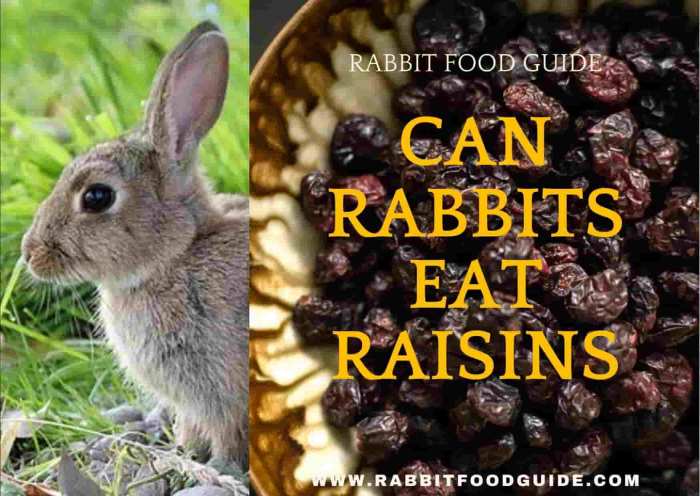Raisins, the dried fruit of grapes, are a popular snack for humans, but can our furry friends, rabbits, indulge in this sweet treat? The answer is yes, but with caution. In this article, we’ll explore the nutritional value of raisins, their potential benefits and risks for rabbits, and provide guidelines for safe consumption.
While raisins can offer some nutritional value, it’s crucial to understand their potential impact on rabbit health before incorporating them into their diet.
Nutritional Information of Raisins

Raisins are a nutrient-rich food, providing a range of essential vitamins, minerals, and antioxidants. They are a good source of dietary fiber, potassium, and iron.
- Calories: 118 per 1/4 cup (40 grams)
- Carbohydrates: 29 grams per 1/4 cup (40 grams)
- Fiber: 1.5 grams per 1/4 cup (40 grams)
- Sugar: 21 grams per 1/4 cup (40 grams)
- Potassium: 230 milligrams per 1/4 cup (40 grams)
- Iron: 1.5 milligrams per 1/4 cup (40 grams)
Raisins also contain antioxidants, such as polyphenols and flavonoids, which can help protect against chronic diseases. They are a low-fat food and are a good source of energy.
Effects of Raisins on Rabbit Health
Raisins, while a nutritious snack for humans, can have both beneficial and detrimental effects on rabbits. Understanding these effects is crucial for responsible rabbit ownership.
Potential Benefits
Raisins provide a concentrated source of energy due to their high sugar content. They also contain antioxidants, such as polyphenols, which can help protect cells from damage. Studies have shown that moderate raisin consumption can improve antioxidant levels in rabbits, potentially reducing the risk of chronic diseases.
Potential Risks
Excessive raisin intake can lead to several health concerns in rabbits:
Digestive Issues
Raisins are high in fiber, which can cause digestive problems in rabbits if consumed in large quantities. The high sugar content can also lead to diarrhea and bloat.
Weight Gain
Raisins are calorically dense, and overfeeding can lead to weight gain and obesity in rabbits. Obesity can increase the risk of other health problems, such as heart disease and arthritis.
Dental Problems
The sticky texture of raisins can cling to rabbits’ teeth, promoting plaque and tartar buildup. This can lead to dental disease, which can be painful and expensive to treat.
Recommended Serving Size and Frequency
Determining the appropriate serving size and frequency of raisins for rabbits is crucial to ensure their well-being. Overfeeding raisins can lead to health issues, while underfeeding may not provide the intended benefits.
Serving Size
The ideal serving size of raisins for rabbits varies based on their age, size, and health status. Generally, a small handful (approximately 1-2 tablespoons) is sufficient for adult rabbits. For younger or smaller rabbits, the serving size should be reduced accordingly.
It’s important to note that raisins should only be offered as an occasional treat and not as a staple part of the diet.
Frequency
Rabbits can safely consume raisins a few times per week. However, it’s essential to avoid overfeeding, as excessive consumption can lead to gastrointestinal issues, weight gain, and other health concerns.Moderation is key when feeding raisins to rabbits. By following these guidelines, you can ensure that your furry friend enjoys this tasty treat without compromising their health.
Alternatives to Raisins for Rabbits
Raisins, while a tempting treat, should be given to rabbits sparingly due to their high sugar content. Fortunately, there are several safe and healthy alternatives that can provide rabbits with the necessary nutrients and enrichment without compromising their health.
Fruits
- Apples: Rich in fiber, vitamin C, and antioxidants. Remove seeds and limit to small pieces.
- Bananas: High in potassium and fiber. Offer small amounts as they are high in sugar.
- Blueberries: Packed with antioxidants and low in sugar. A good choice for occasional treats.
Vegetables
- Carrots: Excellent source of vitamin A, fiber, and beta-carotene. Can be offered daily in small amounts.
- Celery: High in water content and low in calories. A refreshing and crunchy treat.
- Spinach: Rich in iron, calcium, and vitamins. Offer in moderation as it can be high in oxalates.
Herbs
- Basil: Anti-inflammatory and antioxidant properties. Can be offered fresh or dried.
- Cilantro: Rich in vitamin K and antioxidants. Can be used as a garnish or treat.
- Parsley: Contains vitamin C and potassium. A healthy and refreshing addition to a rabbit’s diet.
Last Point
In conclusion, while raisins can be an occasional treat for rabbits, it’s essential to exercise moderation and consider the potential risks. By following the guidelines Artikeld in this article, you can ensure that your rabbit enjoys this sweet treat safely and without compromising their health.
Q&A
Can rabbits eat raisins every day?
No, raisins should not be a daily treat for rabbits due to their high sugar content, which can lead to weight gain and dental problems.
How many raisins can a rabbit eat?
A small rabbit should have no more than 1-2 raisins per week, while larger rabbits can have up to 3-4 raisins per week.
What are healthy alternatives to raisins for rabbits?
Healthy alternatives to raisins include fresh fruits like apples, bananas, and berries, as well as vegetables like carrots, celery, and dandelion greens.